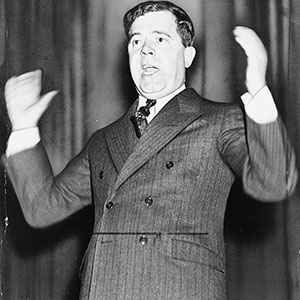Huey Long, who called himself “The Kingfish,” was a powerful Louisiana Democrat who was both loved and loathed by his constituents. Long built a vast political empire while serving as the Governor of Louisiana from 1928 to 1932. While he was elected to the U.S. Senate in 1932, he was assassinated two years later.
Early Life and Political Career
Huey Pierce Long Jr. was born on August 30, 1893, in a rural town in north central Louisiana. During high school, Long won a debating scholarship to Louisiana State University (LSU). However, because he could not afford the textbooks or living expenses, he never attended. Instead, Long worked as a traveling salesman.
In 1914, Long enrolled at Tulane University Law School. While he only completed one year of study, Long was allowed to take the Louisiana bar exam, which he passed. In 1918, Long was elected the Louisiana Railroad Commission, where he made a name for himself fighting monopolies. Four years later, he became the chairman of the Louisiana Public Service Commission, where he solidified his reputation as an anti-corporate and anti-establishment politician.
Governor of Louisiana
Capitalizing on his efforts to protect the poor, Long ran for Governor of Louisiana in 1924. Although he lost, he won election four years later, using the slogan “Every man a king.”
Long was a colorful and polarizing political figure. Once in office, he centralized power in the executive office, seized numerous state agencies, and installed his allies in key government positions. At the same time, Long increased funding for education, infrastructure, and energy, with the goal of improving the lives of poor Louisianans living in rural areas.
Less than a year into his term as governor, the Louisiana House of Representatives voted to impeach him. The nearly 20 allegations against him ranged from accusations of bribery to carrying concealed weapons to “deporting himself scandalously at a New Orleans ‘studio’ party.” He narrowly escaped conviction.
U.S. Senator
In 1930, Long was elected to the U.S. Senate. While he initially supported President Franklin D. Roosevelt and his New Deal Program, Long believed that more aggressive action was needed to aid the country’s poor. In 1934, Long unveiled his Share Our Wealth program. Under the program, the federal government would guarantee each U.S. family an annual income of $5,000, so they could afford the necessities of life, including a home, a job, a radio and an automobile. Long also called for restricting private fortunes to $50 million, legacies to $5 million, and annual incomes to $1 million. In addition, everyone over the age of 60 would be entitled to an old-age pension.
Huey Long was so confident that he would beat FDR in the 1936 presidential election that he wrote a book, entitled My First Days in the White House. However, not long after Long declared his bid for the White House, he was assassinated. Carl Weiss, a Louisiana doctor and the son-in-law of one of Long’s fiercest political rivals, allegedly shot Long at close range in Baton Rouge. Long died two days later of internal bleeding. While his political career was cut short, several of his family members followed in his footsteps.








